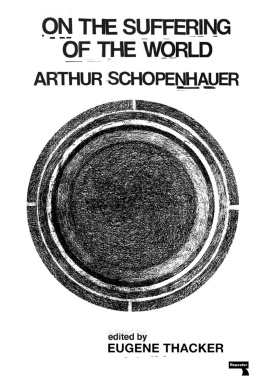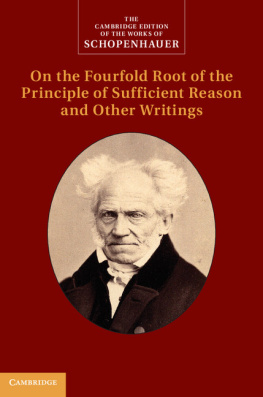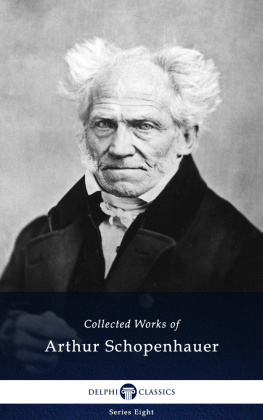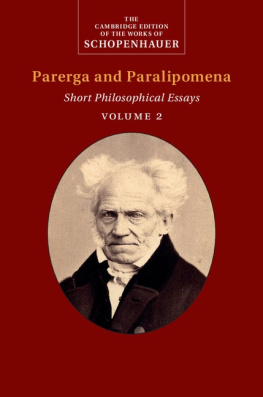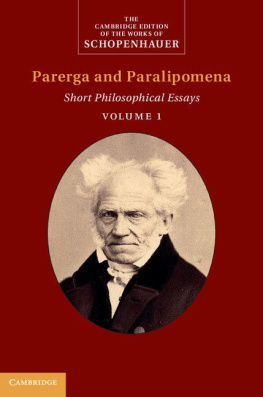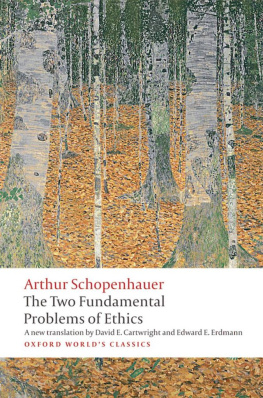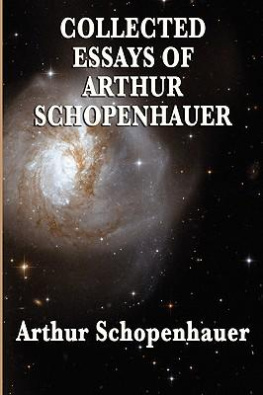Arthur Schopenhauer - On the Suffering of the World
Here you can read online Arthur Schopenhauer - On the Suffering of the World full text of the book (entire story) in english for free. Download pdf and epub, get meaning, cover and reviews about this ebook. year: 2020, publisher: Watkins Media, genre: Science. Description of the work, (preface) as well as reviews are available. Best literature library LitArk.com created for fans of good reading and offers a wide selection of genres:
Romance novel
Science fiction
Adventure
Detective
Science
History
Home and family
Prose
Art
Politics
Computer
Non-fiction
Religion
Business
Children
Humor
Choose a favorite category and find really read worthwhile books. Enjoy immersion in the world of imagination, feel the emotions of the characters or learn something new for yourself, make an fascinating discovery.
- Book:On the Suffering of the World
- Author:
- Publisher:Watkins Media
- Genre:
- Year:2020
- Rating:5 / 5
- Favourites:Add to favourites
- Your mark:
- 100
- 1
- 2
- 3
- 4
- 5
On the Suffering of the World: summary, description and annotation
We offer to read an annotation, description, summary or preface (depends on what the author of the book "On the Suffering of the World" wrote himself). If you haven't found the necessary information about the book — write in the comments, we will try to find it.
Arthur Schopenhauer: author's other books
Who wrote On the Suffering of the World? Find out the surname, the name of the author of the book and a list of all author's works by series.
On the Suffering of the World — read online for free the complete book (whole text) full work
Below is the text of the book, divided by pages. System saving the place of the last page read, allows you to conveniently read the book "On the Suffering of the World" online for free, without having to search again every time where you left off. Put a bookmark, and you can go to the page where you finished reading at any time.
Font size:
Interval:
Bookmark:



Published by Repeater Books
An imprint of Watkins Media Ltd
Unit 11 Shepperton House
89-93 Shepperton Road
London
N1 3DF
United Kingdom
www.repeaterbooks.com
A Repeater Books paperback original 2020
Distributed in the United States by Random House, Inc., New York.
Introduction copyright Eugene Thacker 2020
Cover design: Prema Murthy
Back cover image: NASA
ISBN: 9781913462031
Ebook ISBN: 9781913462048
All rights reserved. No part of this publication may be reproduced, stored in a retrieval system, or transmitted, in any form or by any means, electronic, mechanical, photocopying, recording or otherwise, without the prior permission of the publishers.
This book is sold subject to the condition that it shall not, by way of trade or otherwise, be lent, re-sold, hired out or otherwise circulated without the publishers prior consent in any form of binding or cover other than that in which it is published and without a similar condition including this condition being imposed on the subsequent purchaser.
Printed and bound in the United Kingdom by TJ International Ltd
Contents

Portrait photograph of Arthur Schopenhauer, 1859
I NTRODUCTION
A P HILOSOPHY I N R UINS , A N U NQUIET V OID
As soon as I began to think, I found myself at variance with the world.
Schopenhauer, Manuscript Remains
1. I N T HIS C OLONY
In the south of France lies the Mediterranean city of Toulon, where to this day there are ruins that once belonged to the infamous penal colony, the so-called Bagne of Toulon. Established in 1748 by King Louis XV , it was created to house the prisoners who had been sentenced to row in the galleys of the French navy, the ships of which had since been decommissioned. While prisoners continued to be confined to the galleys, the penal colony also housed prisoners in large, dry-docked prison ships, in newly-constructed makeshift halls, and in disused armories. As the prisons population steadily grew, the already-deplorable conditions of the penal colony further declined. By the beginning of the eighteenth century, the Bagne of Toulon held over four thousand prisoners, organized into different classes according to their crimes and sentences. Shackled, malnourished, sickly, and abandoned to forced labor, the harrowing conditions of the Bagne of Toulon have become the stuff of myth, most famously depicted in Victor Hugos novel Les Misrables .
It was this scene that a sixteen-year-old Arthur Schopenhauer witnessed first-hand as part of a European tour with his family and here I should add something to this brief description. The penal colony in Toulon not only had a practical function; or rather, we should say it had two practical functions. One was the incarceration of the prisoners into a stratified, miniature city-within-a-city. But government officials also seemed to understand the moral, political, and even existential functions of allowing the colony to be seen and to be put on display. Thus, by the early nineteenth century, the Bagne of Toulon had also become a spectacle, a tourist destination for travelers passing through the south of France. Guided tours allowed visitors to see first-hand the dual horrors of a life of crime and a life of incarceration. Prisoners put on a display for viewers, staggering and shackled, a garish and unsettling theater of moral didacticism that seemed to evoke the lower circles of Dantes Inferno or to look forward to the extremes of the Grand Guignol. And it was here that the wayward, brooding, teenaged Schopenhauer had a kind of epiphany.
To be sure, the Schopenhauers tour was not all gloom and doom. Young Schopenhauer witnessed a wide range of European culture and life, from regional festivals to religious ceremonies, from bustling cities to remote landscapes, a heady mix of languages, customs, cuisine, art, and the like; Amsterdam, London, Paris, Bordeaux, Marseilles, Le Havre, Geneva, the Alps, Vienna, Berlin all the sights and sounds that European culture had to offer an educated, mercantile, bourgeois family. Schopenhauers travel diary from this period offers evidence of these varied experiences though it is written in a balanced, almost detached tone. In London, for example, the performance of a ventriloquist one day will elicit the same detached response that a visit to Westminster Abbey will the next. Even a public hanging in London elicits no more intense a response than that of the ventriloquist (though Schopenhauer notes, almost clinically, that even during the sad spectacle of their deaths, as the rope is placed around the necks of the convicted, their souls already appeared to be in the next world)
The one experience that does make an impact on Schopenhauer is the penal colony. Here Schopenhauers diary breaks its predictable formality and something else peaks through. In his 1804 diary, he reflects on the scene, noting the stratification of prisoners, the differences in their punishment, the types of labor performed, and so on. Those who have committed serious crimes work in twos, chained together by their feet with heavy chains, while the most severe criminals are forged to the benches of the galley which they do not leave at all. In disbelief Schopenhauer continues, his writing already becoming metaphorical: I do not understand how, without more substantive nourishment and consumed by grief, they do not succumb to their heavy labor; for during their slavery they are treated entirely like beasts of burden. He notes the architecture of the carceral surroundings, the old condemned ships which to Schopenhauer seem to be the dirtiest, the most revolting place of sojourn imaginable. Of existence in this place, he writes: it is terrible to think that the life of these miserable galley slaves, if that is not an exaggerated word, is totally devoid of joy: and for those whose sufferings have no end even after twenty-five years, also totally devoid of hope. Schopenhauer then begins to pose questions it is too tempting not to call philosophical: And when finally, the moment arrives which one has longed for with desperate sighs for ten or twelve years: the end of slavery: what is to become of this person? They return to a world for which they have been dead for ten years.
Without really knowing it, Schopenhauer began to glean an insight from this haunting scene: the penal colony outside the penal colony. One escapes a prison of suffering only to enter another prison, and so on. It is manifest for the brooding teenager not in the minutiae of local politics, French history, or the punitive mechanics of the legal system, but in the contorted and stressed bodies of the prisoners, in their world-weary physiognomies: can one imagine a more terrible sensation than that of those wretches, chained to a bench in the dark galley, from which nothing but death can sever them! Remarkably, he then adds, with uncanny precision, for some perhaps the sufferings are made worse by the inseparable company of the one chained to them by the same chain. I cant stand my neighbor. The entire experience is summed up in the diarys most concise line: the fate of these unfortunates seems to me far more terrible than a death sentence.
Next pageFont size:
Interval:
Bookmark:
Similar books «On the Suffering of the World»
Look at similar books to On the Suffering of the World. We have selected literature similar in name and meaning in the hope of providing readers with more options to find new, interesting, not yet read works.
Discussion, reviews of the book On the Suffering of the World and just readers' own opinions. Leave your comments, write what you think about the work, its meaning or the main characters. Specify what exactly you liked and what you didn't like, and why you think so.

